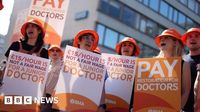Resident doctors in England have once again voted to take strike action in a move that underscores ongoing tensions over pay and working conditions within the National Health Service (NHS). The British Medical Association (BMA) announced on July 8, 2025, that more than 26,000 resident doctors voted in favour of industrial action, with a turnout of 55% among eligible members. This vote grants the BMA a six-month mandate for strikes, covering the period from July 21, 2025, to January 7, 2026.
The term "resident doctor" replaced "junior doctor" last year to better reflect the expertise and responsibilities of these medical professionals. Despite a 5.4% pay increase awarded by the government for the current financial year, the BMA insists this falls far short of what is needed to restore pay to its real value. They argue that since 2008, resident doctors' pay has effectively declined by 29.2% when adjusting for inflation, and they are demanding a pay rise of that magnitude to achieve "full pay restoration." This latest ballot reflects deep frustration with what the union describes as "below-inflation pay rises" and a failure to adequately address historical pay freezes.
"Doctors have spoken and spoken clearly: they won’t accept that they are worth a fifth less than they were in 2008," said Dr. Melissa Ryan and Dr. Ross Nieuwoudt, co-chairs of the BMA’s resident doctors’ committee. They stressed that while their pay may have declined, their will to fight remains strong. "All we need is a credible pay offer and nobody need strike," they added, emphasizing that fresh talks with the government could still avert a walkout.
However, the government has firmly rejected calls to reopen pay negotiations. Downing Street confirmed that it "can’t be more generous than we already have this year," pointing to a 28.9% pay rise awarded over the last three years, which included a substantial 22% increase last year. Health Secretary Wes Streeting warned that there are "no grounds for strike action now" and cautioned that the public "won’t forgive" further strikes. Speaking on July 8, 2025, after meeting with BMA representatives, Streeting reiterated that the government cannot go beyond the 5.4% pay rise already granted for 2025-26 and emphasized the potential harm strikes would cause to patients.
"While the majority of resident doctors did not vote to strike, it is disappointing that the BMA are threatening strike action that would harm patients and set back all the progress we’re making with the NHS," Streeting said. He offered to continue working with the BMA to resolve issues around working conditions but maintained that these concerns do not justify strike action. The government's stance reflects a broader challenge: balancing the need for fair pay with fiscal constraints amid the NHS’s vast workforce of approximately 1.5 million people in England.
The strikes threaten to disrupt the NHS at a critical juncture. NHS leaders warned that industrial action could jeopardize efforts to reduce waiting lists and deliver on the government's ambitious 10-year plan to transform the NHS into a more digital and community-focused service. Matthew Taylor, chief executive of the NHS Confederation, highlighted the risk that strikes by resident doctors could lead to tens or even hundreds of thousands of cancelled or postponed appointments and operations. He also warned that tensions might rise among different NHS staff groups, with nurses and other workers also considering industrial action over pay and conditions.
The Royal College of Nursing (RCN), representing 345,000 members, is currently consulting its members on a 3.6% pay offer, which it has described as "grotesque." RCN general secretary Nicola Ranger noted that nursing staff are "voting in strong numbers and telling the government to go faster in repairing a damaged NHS and undervalued workforce." Unison, another major union, is also undertaking indicative ballots to gauge strike willingness among its members.
Resident doctors’ pay scales vary widely, from around £37,000 to £70,000 annually for a 40-hour week, with additional payments for night shifts and weekends. The 5.4% pay increase awarded for 2025-26 is set to be paid from August, following a 22% rise over the previous two years. Despite these increases, the BMA criticizes the government’s offer as "woefully inadequate" and "derisory," insisting that the 29% pay restoration sought would be spread over several years rather than demanded all at once.
The BMA has also indicated that other senior medical staff, including consultants and specialist doctors, may soon be balloted on industrial action. Consultants have been offered a 4% pay increase, which the BMA has called "an insult to senior doctors." An indicative ballot for consultants is scheduled to begin on July 21, 2025, signaling the potential for coordinated strikes across different medical grades.
This ongoing dispute follows an intense period of industrial action in 2023 and 2024, when resident doctors participated in 11 separate strikes, resulting in the cancellation of nearly 1.5 million outpatient appointments and other procedures. The last strike concluded just days before the 2024 general election. The government’s largest pay award to resident doctors in recent years, the 22% rise, was intended to end those strikes, but clearly, discontent remains.
Danny Mortimer, chief executive of NHS Employers, described the prospect of renewed strikes as "a troubling development" and "the last thing health leaders wanted." He warned that such action could leave patients in pain and discomfort due to delayed or cancelled treatments. Mortimer urged the BMA to consider alternative responses and to work collaboratively with NHS trusts to improve working environments for resident doctors.
Meanwhile, the Department of Health and Social Care emphasized that strikes should be a last resort due to their "extremely serious consequences for patients." A spokesperson noted the disappointing continuation of strike threats despite the significant pay rises awarded over recent years.
As the NHS faces the possibility of fresh strikes, the government and unions remain at an impasse. The BMA’s mandate for industrial action extends into early 2026, and with other staff groups potentially joining the action, the coming months could see significant disruption to healthcare services across England. The question remains whether negotiations can be revived to prevent further strikes or whether the NHS will once again be paralyzed by industrial unrest.


